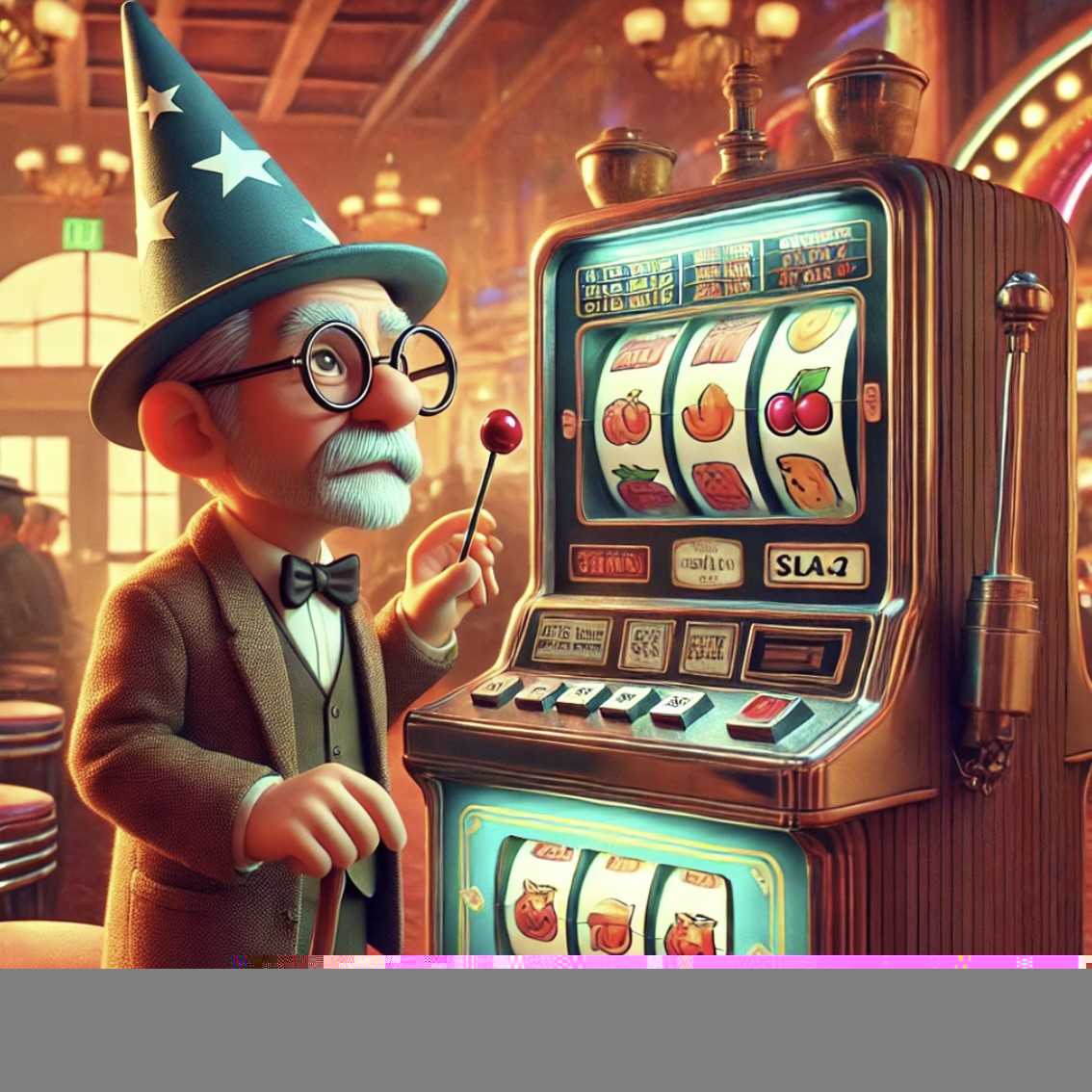On this page
The Evolution of Slot Machines
On this page
Introduction
As is the case with virtually any other piece of technology, people in the nineteenth century who played the slot machines that were available then would be shocked and astounded to see what the slot machines of today are capable of. Equally, slot players today would be largely bored to death to play the slow moving single-line machines with truly mechanical reels and only a few symbols, there were certainly no, 'Free Games,' unless some proprietor took it upon himself to have the establishment finance a free spin for the player for every x number of paid spins he attempted.
In fact, perhaps something along those lines was among the first of the, 'Casino Slot Promotions,' which would eventually grow into concepts such as Free Play on Player's Club Cards, Jackpot Bonuses, Loss Rebates and who knows what else. In fact, Eleanor Dumont might have been one of the first proprietors in the United States to offer free alcohol to her Blackjack players all those decades ago in Nevada City, California, so who knows what happened with the Slots?
Bavarian Charles Fey
What we do know is that Bavarian Charles Fey immigrated to America at the age of 23 and after his uncle moved here, and that he is the person who invented the slot machine. Due to laws regarding such devices at the time, however, he was unable to secure a patent. In fact, so little is actually known about this that there is some dispute with respect to what year Fey's slot machine was actually perfected.

Liberty Bel
The machine was called, 'Liberty Bell,' and one could argue that it was really meant to be more akin to a Video Poker device than it was to a slot machine. While there were no player decisions that could affect the outcome, as the one-step process of pulling the lever (or, as today, pressing the button) was what adjudicated the outcome, Fey's machine was largely meant to be modeled after Poker. His machine contained only six symbols, those included Hearts, Spades, Diamonds, Clubs, Horseshoes (which may have been considered lucky even at that time) and the Liberty Bell. Lining up Three Liberty Bells on the Payline offered the highest pay that the machine would yield.
It was difficult for Fey to claim any intellectual right to the property because there were laws in place at the time that prohibited him from copywriting the invention, so similar devices quickly appeared elsewhere that had nothing to do with Fey. Of course, demand for all of these products (which were truly a novelty at the time) was so great that the competition did not stop Fey from renting out his machines to a myriad of different establishments.
Eventually Fey's home State of California would go on to make the devices illegal, a fact that persists in California to this day with exception to Indian Casinos, but the slot machine was so popular elsewhere that the law in California didn't put much of a dent on Fey's business.
There were no meaningful regulations in place at the time one way or another, in most jurisdictions, as the slot machine was as new as a concept in the world as Online Gambling was back during the early Internet boom. Nobody knew exactly what to do with it, but there are still a number of parallels between the first machine created by Fey and the slot machines that many gamblers play and enjoy today. In fact, it might actually be argued that the most major difference is in the presentation.
Online Slots Bonuses View All
Bonus Code
- 120 times on Poker, American Roulette, Roulette
- 240 times on Baccarat
- 600 times on Video Poker
- 1200 times on Blackjack
Bonus Code
- 120 times on Poker, Roulette
- 240 times on Baccarat
- 600 times on Video Poker
- 1200 times on Craps, Blackjack
Bonus Code
- 125 times on Poker
- 250 times on Classic Blackjack, Video Poker, Blackjack
- 500 times on American Roulette, Roulette
Similarities
One of the similarities in Fey's machine is that the operation was simple: You put in a coin, pulled the handle and a winning combination of symbols either lined up or did not line up. It is true that slot machines mostly operated with TITO technology now, and that there is even the capacity to play fractions of a penny (some machines) as credits or to play a myriad of paylines, but the fundamental, 'Pull the lever and see what happens,' remains the same.
Another similarity between Fey's device and the modern slot machines of today is that most gamblers would play the slot machine without knowing what the probabilities of a particular result were, and moreover, without knowing the overall Return-to-Player (i.e. House Edge) of the machine in question. The tendency of gamblers to be attracted to the simplicity of performing a single simple physical action and generating a result, as well as the payout of many times the amount bet has certainly not abated, despite the fact that it has been over a century since the advent of the original slot machine.
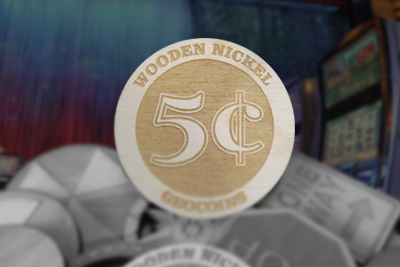
One final similarity between the original Slot Machine and the Slot Machines of today is the fact that there were people out there who attempted to Advantage Play the original slot machine, although, those original attempts were nothing more than outright stealing. Essentially, people would attempt to play the machine using wooden nickels or other pieces of fake currency in an attempt to convince the slot machine that it was taking actual money. In this sense, Fey also invented the first countermeasure in the form of a pen that could be used to check the legitimacy of the coins themselves.
First Video Poker
In the early 1900's, the first, 'Draw Poker,' machine was released in that players actually attempted to hold cards (represented as symbols, as today) and then use a second draw in order to improve their hands. Again, with little actual regulation in place, the machines could theoretically offer terrible odds with respect to the pays that would render such machines unlawful in jurisdictions that require minimum payout percentages, or alternatively, the machines did not actually have to represent the same probabilities as would be found with a randomly shuffled deck of playing cards. To the latter problem, I'm not actually suggesting that the machines never did correspond to the probabilities of a random deck, I'm simply suggesting that there was no regulation or oversight in place that would actually necessitate that.
In terms of Regulations, the vast majority of regulations that came out in the early years of slot machines were such that the machines were simply made patently illegal to possess, and in some cases, illegal to actually play. There were a number of work-arounds for this, however, in the sense that a proprietor of a business hosting such a machine could make it so that the bets would win, 'Prizes,' as opposed to actual money. Of course, the proprietor could also have it such that the prizes could be, 'Sold back,' to the proprietor for a sum of money such that the player would always want to take the money, therefore, the slot machine effectively paid out in money.

Cherry Masters
In some cases, similar machines called, 'Cherry Masters,' of varying legality, can be found in some truck stops and other locations around the country even today. In many of these cases, the machines (that usually have horrible Odds against the player) payout in the form of, 'Merchandise Credits,' whereas (albeit rarely) some establishments will still exchange the tickets that the machine prints out for cash. Of course, these machines are better left unplayed, but if you do decide to play them, it will definitely be to your benefit to ascertain ahead of time what the Rules regarding the establishment are should you wish to, 'Cash out.' Some establishments maintain that the machines are, 'For Amusement Only,' and actually mean it whereas others will allow someone to play it such that things of material value, or straight up money, can actually be won.
There are also other machines out there fundamentally similar to these, 'Cherry Masters,' but the overall concept is the same and the Odds offered tend to be horrible for the player.
The Odds
Speaking of the Odds, there are, in fact, Regulations that are now in place to protect the players from bucking ridiculous Odds against them. Furthermore, these Regulations also work to the advantage of both the manufacturers and casinos, it could be argued, because many people would simply stop playing Slots if they felt that they had absolutely no chance of winning. As evidence of this fact, one could simply peruse any gambling report out there and note that the returns for all denominations of slot machines tend to be significantly in excess of what the minimum percentage requirements are for each particular jurisdiction.

That such is the case is obviously no accident, pursuant to Nevada law, a machine could theoretically hold 25% of all monies put into it over the long-run as Nevada only proscribes a minimum return-to-player of 75% for an individual unit. Interestingly enough, the majority of states that have regulated Commercial Gambling necessitate a greater minimum Return-to-Player than that established by Nevada. West Virginia, just for one example, allows a machine to hold no more than 20% (80% Return-to-Player) and as a practical matter, almost all of the machines in the state, if not all of them, return at least a few percentage points greater than that as evidenced by any gambling reports that are easily accessible to anyone wishing to look.
Of course, using Wooden Nickels was not the only form of cheating, or at least attempts to cheat, that were prevalent with the oldest slot machines...and there were also a number of cheating methods on machines that came out more recently than that. (as will be described later) For one thing, prior to there being effectively a chute that the coin had to roll down, some old slot machines simply registered that a coin had been placed into the machine, but the coin was otherwise unprotected. One trick that evolved as a result of this fact was known as the, 'Yo-Yo,' which was a simple heist in which players would tie a string around a coin and then, whether or not the bet won or lost, they would simply pull on the string to remove the coin and use it to make another play!
Another cheating method that was used in the olden days of slot machines, or at least attempted, was a good old fashioned, 'Tilt Maneuver,' all this entailed is a player attempting to tilt a mechanical reel machine so that a desired symbol would end up on the Payline and then hoping that the machine would register that as a payout. There were also other attempts made to physically compromise mechanical reel machines such as attempting to gain access to the actual physical reels and set them in place such that a payout would be yielded, but even in the olden days, that would accomplish nothing on most devices aside from breaking them...and often...something else would be broken very shortly thereafter.
If you think that people have a fundamental misunderstanding of the Odds now, then the original Video Poker machines would have been a sight to behold! Many of these Video Poker machines would have payouts as low as 50-For-1 on a Royal Flush, which, given the actual probability of a Royal Flush, is darn near as good as paying a player nothing on that result! However, there were really no sophisticated sources out there (such as this website) for letting people know whether or not they were getting a good gamble, what the Optimal Plays were, etc...and, as a result, playing the original several Video Poker machines would have been little different than playing Slot Machines with the only exception being the illusion of control.
Of course, the players were not the only individuals out there who sought to change the edges one way or another. The proprietors of the establishments were also greedy, at times, and sought to increase the play as well as the return on their slot machines. One example of a way to do this was simply to have Shills in there playing the machine (or claiming to) who might either claim to have hit some of the highest pays with a mathematically improbable frequency, or alternatively, to actually play the devices until they had a good hit and then behave in a very excited way about it! Obviously, they would have lost money on the overall play, had they been actually playing with their money, but really they would be playing with the money belonging to the establishment so the establishment was essentially paying itself when it came time to pay out. However, seeing a Jackpot or high-level pay happen would be enough to entice many others present to jump in!
 Most Popular Slots for Players from Ohio
Most Popular Slots for Players from Ohio
Eddy Vegas Casino
Pharaoh's Treasure
 Play
Play
Reels
Bonus Game
RTP
Volatility
Paylines
Jackpot
Niyvi Casino
Mercy of the Gods
 Play
Play
Reels
Bonus Game
RTP
Volatility
Paylines
Jackpot
Niyvi Casino
Mega Fortune
 Play
Play
Reels
Bonus Game
RTP
Volatility
Paylines
Jackpot
Niyvi Casino
Divine Fortune
 Play
Play
Reels
Bonus Game
RTP
Volatility
Paylines
Jackpot
Misconceptions
Another similarity between those machines and the machines of today is that misconceptions would often abound. While certain poorly designed mechanical reel machines may or may not have been predictable, (if you knew how many reel positions there were and there was some pattern to how many positions the game moved prior to the reel stopping, then that information could be used-after tracking-to determine when a payout would occur) a wide range of absurdities that are still uttered in casinos to this day abounded:

'If the machine goes a long time without winning, then it is due.'
'If the machine has won recently, then it will usually win again in a short period of time.'
The above won is my absolute favorite because, if it was true, then every single machine out there would win big amounts essentially infinitely! Think about it: If it is true that when a machine hits it is going to hit again in the near future, then all machines would be perpetually hitting from now until the end of time and everyone would win by virtue of walking into the casino!
'If you hit two of the symbols on the Payline, that means that you are very close to hitting all three.'
Anyway, these misconceptions were likely just as prevalent among slot players back then as they are today, which, despite how slot machines have themselves evolved shows that the average slot player has not evolved with them! The only thing that the average slot player wants now compared to what they wanted then is more features, more sounds and more bright flashy lights! We've got Buffaloes stampeding across the screen, Britney Spears dancing around all over the place, Mr. Big from Sex and the City representing the top pay and Dorothy and the Tin Man from the Wizard of Oz sitting right next to Willy Wonka and Veruca Salt just across from the Greasy-Haired guy from The Walking Dead and John Travolta from Grease adjacent to seventeen different Variations of the Quick Hits title....
However, people persist in having fun with it, so as long as their, 'Fun,' is actually fun for them and they are keeping it under control, it is tough to fault anybody for enjoying themselves.
Quick Hits, super fun, by the way. #NotBeingPaidToSayThat
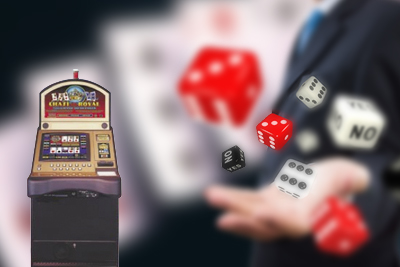
Comps
There's also the question of Comps in order to keep players interested and actively playing. Earlier on this Page, I postulated that I would hardly be surprised if some of the original proprietors of establishments housing some of the oldest slot machines did not, 'Pay,' for one of their customers' spins from time-to-time, and Complimentaries still work to this day to keep people playing. Furthermore, the proprietor might have offered free beverages to players, free cigars, or any other number of potential niceties in order to keep the player engaged in the machine.
However, there is some question as to what degree of comps are necessary to keep players involved in the game, in fact, if any.
Perhaps the most fundamental Comp associated with Vegas Casinos when it comes to Slot Players (or players of anything, really) is Complimentary Drinks so long as the player is actively playing. For many years, these Complimentary Drinks were all but unconditional, if you were parked at a machine and at least appeared to be playing, you were entitled to free drinks. Sometimes, people doing nothing but sitting next to you would also get free drinks. In fact, I can verify that such just happened in Atlantic City at the Golden Nugget when my girlfriend was offered a Free Drink sitting next to me though she was not playing anything. Of course, I tend to tip the cocktail waitresses a dollar a drink with the first tip being upfront, (gets me my drink quickly!) so that may have been a factor in that decision.
The point is that the concept of a, 'Free Drink,' is something that has risen to being almost a necessity in order to keep players playing, but is it really? If you take a look at the State of Ohio, casinos cannot legally offer their patrons Free Drinks, and yet the slot numbers come in month after month and the Ohio Casinos continue to have positive revenues and profitability. Furthermore, there are casinos that do not, either by way of law or because they choose not to, offer free drinks to players in relatively close proximity to casinos that do and they do not seem to be hurting in all cases for players.

MGM is a chain that has at least tested this theory to a limited extent by way of attempting a voucher system at certain casinos by which players must have a certain amount of play (either by way of time or dollars bet) at which point the machine will spit out a drink voucher. In that sense, Free Drinks may still be given, but they might not be a given. Some might suggest that Free Drinks are such an expectation in Las Vegas that no Las Vegas casino could ever get away with refusing to offer them, (while all of the competition still is) but all successful implementation of a measure such as that would require is effective collusion...just like the spread of 6:5 Blackjack for low Limits at the Las Vegas Strip properties.
With respect to the Blackjack, Downtown has somewhat become an exception, or rather an alternative, to the rule as opposed to the Las Vegas Strip and I could certainly see that trend continuing as well as bleeding into the dispensing of Free Drinks by the casino. All it would really take is effective collusion by the Strip Casinos to simultaneously, or near-simultaneously, stop offering Free Drinks to anyone other than those playing at a certain level. Many visitors to these casinos frequent the clubs in said casinos in which drinks must be purchased, and often at a huge premium, anyway, that what almost appears to be the target market of these casinos might, by and large, not care too terribly much if players ceased getting Free Drinks, anyway.
Negative Reputation
Getting back to the topic at hand, Slot Machines essentially entered a period of dormancy for several decades for a number of reasons: The first of which is the fact that Slot Machines developed an increasingly negative reputation as being associated with illegal activity. There are a myriad of reasons behind that, but perhaps the largest of those is that slot machines, in many jurisdictions, were actually illegal and still being played. Furthermore, in many other jurisdictions, they may not have been directly determined to be illegal, but may have had the conception that they were illegal attached to them.

In fact, that is largely comparable to Online Gambling throughout the United States in the sense that many people out there actually believe that it is Patently Illegal. As my study found, there are a great many states in which that is not the case, and furthermore, there is absolutely NOTHING at the Federal level that prohibits a mere player from playing Online. (Though many people erroneously still believe that it is across-the-board illegal in the United States). With many States that illegalized Slot Machines or all forms of Gambling, (with verbiage that many current State Laws as relates to gambling still employ) the perception may have been that they were always illegal or were illegal unless there was a law in place specifically legalizing them in a state.
Also detrimental to the public perception of Slot Machines was the fact that during the Dark Ages...um….Prohibition Era, Slot Machines became widely associated with taking place in Speakeasies that disseminated alcohol illegally. After all, even in those jurisdictions in which Slot Machines were illegal, 'Gambling,' or, 'Possession of a Gambling Device,' was effectively little more than an add-on charge to the possession or sale of alcohol. For that reason, there was little with respect to consequences that would prevent proprietors from making money off of Slot Machines and Video Poker devices as well as their alcohol sales.
Bally Technologies

The main turning point for Slot Machines, from a design aspect, would come with the Money Honey slot machine manufactured beginning in 1963 by Bally Technologies Inc., a name that is quite familiar to slot machine players even to this day. Bally Technologies has continued to be on the cutting edge of innovation of devices and it is nearly impossible, if not outright impossible, to go into a Brick and Mortar regulated Commercial Casino without seeing that familiar red, 'B,' on a plethora of the gaming devices.
The Money Honey as well as other Bally machines to come out during this time were the first to make use of Electronic components causing the machine to light up in the actual reels, as well as for the words, 'Winner Paid,' to appear in red lights on the machine. While such a machine might seem basic to us now, it was definitely something to behold at the time and one would expect that it maintained a player's interest at least as long as the average slot machine that can be found in modern casinos does. Bally would soon follow this up with a slot machine that offered the capacity to play multiple Pay Lines as well as to play multiple coins on an individual playline.
Multiple Paylines
The ability for Multiple Paylines to be bet upon is nothing new to us in this day and age, in fact, there are a wide variety of Slot Machines out there, including some that are manufactured by Bally, in which it is impossible to NOT play multiple paylines. This is most often the case with respect to low denomination slot machines, especially machines in which the denomination is a nickel or less, which tends to lead to the player perception that they are not risking very much per game...though the maximum bet on many of these games may exceed the maximum bet (in terms of dollars and cents) of some quarter and higher denomination games out there!
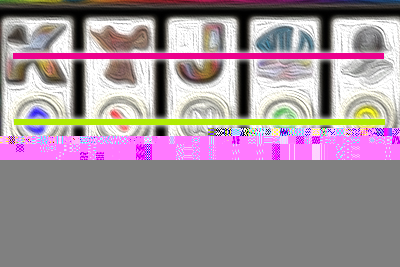
The advent of machines upon which multiple Paylines could be played was huge because it lent itself to player perception that the game was, 'Easier,' to win. After all, it seems pretty intuitive that having three Paylines as opposed to just one triples the Probability that a player is going to win. The aspect of such games that did not seem to enter into player's minds at the time was, assuming everything else was equal in terms of probabilities for each line, the player had the potential to lose all three coins bet so that a single loss would actually cost the player more money.
Another effect of this was that players might occasionally not be satisfied with jackpot amounts that would have once left them satiated. For example, a Line Pay of 100-For-1 represents 100x the bet if the player is playing a Single-Line game which might be sufficient for the player to quit, however, that same Pay on a single line only represents 33.3x the bet in the event that there are no wins on any other Lines. Therefore, it might require a greater jackpot in order for the player to be satisfied, perhaps only the top Line Win possible would suffice for the player.
Electronic components are also something that players take for granted in this day and age, and that is made obvious by the fact that coin-droppers are largely something of a relic and games that largely resemble multimedia entertainment more than they do a traditional slot machine have gained popularity in recent years. In terms of the display, slot machines have become ever more complicated, but in terms of the concept of sticking money in, hitting a button and probably losing....they haven't changed at all!
If anything could be said to have changed, it would definitely be the expectation of how a Slot Machine is supposed to perform for an establishment financially. The earliest slot machines were something of a novelty, even in the event that one or a few units would be located in a proprietor's establishment, only on extremely rare occasions would the machine be the primary source of revenue for a given location. When it came to the first legalized and expressly regulated slot machines in Nevada Casinos, this expectation was largely the same. Slot machines were implemented in these casinos and were expected to be played largely by ladies who accompanied their husbands and/or significant others who were playing Table Games. Certainly the Slots were expected to hold their own financially, but even then, they were not expected to be a principle source of revenue...at least not initially.

Gained Popularity
As Slot Machines became both more common and gained wide acceptance, at least within the realm of legalized casinos, the devices eventually expanded in both players, numbers of units, and obviously as a result, floor space. Once viewed as essentially a pastime for women who were with their partners in the casino, Slot Machines then occasionally began to gain the interest of men. Eventually, Slot Machines would largely pull even with other forms of Gambling within a given House, and only shortly thereafter, Slot Machines began to surpass Table Games in revenue.
These days, if one is to look at any revenue report of a Commercial Casino, it is absolutely no contest despite the fact that the vast majority of Table Games offerings have better Odds than Slot Machines. One reason for the popularity of Slots, at least as far as their initial popularity was concerned, is how cheap it was to make a single bet! Much as it is even in this day and age and resources such as this website available for all to see, people do not necessarily consider the House Edge of the game they are playing nor do they take into consideration the Expected Loss per Hour. Table Games, simply put, take longer to resolve than a pull of a Slot Machine, so in terms of time value alone, one is better off to go with Table Games.
Interestingly, it was the Slot Machines, at least a concept inherent in them, that led to one of the more profound evolution's with respect to Table Games: The Side Bet. One component that Slot Machines had that Table Games were missing was the potential for a large jackpot which was significantly more than the amount bet. It may have been this, 'Jackpot,' potential that led some players that would normally play Table Games to the Slot Machines in the first place, and while each individual house really just has an interest in making money, there are a number of people with a vested interest in maintaining the viability of Table Games. There will be more on that in my, 'Evolution of Table Games,' page.

One thing that did not change was the fact that Slot Machines were around to stay, and they are the largest gambling revenue generator for casinos all the way to this day. In fact, the Slot Parlors in the State of West Virginia all produce more revenue than not from their combination Keno/Slot/Video Poker machines, and they are restricted to five machines in an establishment! Another similar business venture, competing against a plethora of Honest-to-God Resort Casinos is the chain of Dotty's locations, many of which are located in Las Vegas.
For many of these, 'Parlors,' as they are called in West Virginia, machines are literally the only form of revenue the establishment takes in that is in any way meaningful. It is true that some of them sell beer, but they usually do so for break-even prices in order to encourage players to play there. In fact, the restaurant chain, Perkins, has a parlor at their Wheeling, WV location in which, as of the time of this writing, they offer $1 beers and 50% off of anything on the menu as well as a special $2 menu for players.
Significant Gambling Revenue
In other words, the Slots went from being something of an add-on, more an afterthought than anything, to being the single most significant gambling revenue generator in the entire country with exception only to State Lotteries.
While it is difficult to pinpoint a date, it was right around the time of the introduction of the Bally Technologies Money Honey that the casinos and manufacturers realized that they could offer potentially huge payouts and the inherent edge of the slot machines that they enjoyed would work itself out over time to such an extent that there is no way they would lose money. This was a concept that could not be enjoyed as regularly by the illegal operators (or operators of varying legality) because a huge Jackpot or a few Jackpots in relatively short succession might be difficult for them to recover. This fact is even reflected in certain casinos today that are hesitant to offer some machines with enormous potential jackpot liability compared to other larger casinos or casinos within the realm of a chain.
Modern Slot Machine

While the potential for larger jackpots was quickly becoming a reality for the Slot Players at Nevada casinos, slots were continuing to advance on a technological level, as well. This fact is evident from the, 'Fortune Coin,' slot machine that was developed in the 1970's and used an actual projection screen, similar to that on a television, as well as computerized reels by which the results would show up on the projection. The, 'Fortune Coin,' in terms of presentation, is probably the true predecessor to the modern Slot Machine.
Within a few years, the computer technology ended up being such that Slot Machines could be linked in order for a huge Jackpot to be shared amongst a bank of machines. The first of the, 'Video Slot Machines,' was such that it still operated completely independently of the other machines in the sense that there were no shared Jackpots or Progressives.
These machines, and almost all if not all machines before them were something that I would term, 'Flat Tops,' in the sense that the Top Payout of the machine was a Fixed, rather than Variable, payout. As a result, there was no Traditional way to Advantage Play these machines. It was a simple matter of each symbol having a certain designated probability of appearing on a Payline, which yielded a probability of three like symbols appearing on a Payline, and the probabilities multiplied by the returns for every possibility subtracted from 100% would result in the House Edge of the machine.
Progressives
During this time came the advent of Progressive machines that offered the opportunity for a Variable payout as well as the potential for Advantage Play. That is true for both Slot Machines as well as Video Poker, but with Video Poker, the pay schedule of the game makes the positive, 'Play,' points more easily known whereas, lacking access to the PAR Sheets, playing a Slot Machine at an advantage requires either sophisticated guesswork or an actual Empirical study to determine the probabilities, and therefore, the Base Return of the game.

Progressive machines did not enjoy the popularity when they first arrived on the machine scene that they do today, and the process of them spreading to, perhaps as many as half of the offerings of some slot floors (in one fashion or another) could not be predicted at that time. The first Progressives to come out were extremely straightforward, Royal Flushes would be awarded a Progressive in the event that the player hit them, and whatever the top result of a given Slot Machine was could often result in a Progressive.
Before we discuss the Progressive that changed the game forever, we should briefly discuss the evolution of Progressives with respect to an individual machine or individual bank of machines separately, in terms of evolution. The fundamental concept of a Progressive machine is relatively unchanged in terms of how the meter increases. Every Progressive meter starts at a certain, 'Base,' amount and it is the probability of hitting that Progressive at the Base (i.e. the very first spin) and the associated payout combined with the payouts of all other winning combinations and those probabilities therewith associated that determine the, 'Base Pay,' of a machine. In other words, at their very Base point, Progressives function no differently than any other machine.
The difference that comes into play with a Progressive is that, in addition to the Base Return percentage, a certain percentage of the bet is either directly or conditionally added to the Progressive in the event the Progressive is not hit on that spin. When I say, 'Conditionally,' that simply means that the advancement of some Progressives is, 'Win Based,' meaning a percentage of the amount won gets added to the Progressive.
When it comes to the Progressives I describe as, 'Win-Based,' in my personal experience, they are a minority. I think that the idea behind the original concept of those was simply that a player would feel like he was personally responsible for advancement of the Jackpot, but aside from that conceptual theory, I find them silly. For example, given the Law of Large Numbers, the Progressive is going to advance in a manner consistent with the probabilities and pays associated therewith, so if you have a machine that always advances the Progressive to the tune of 1% of all coin-in compared to a machine with a Base Hold of 90% that advances it to the tune of 1% of all monies won...then you simply have a second machine that advances the Progressive to the tune of 0.9% of all coin-in...so why not just make a machine that advances it 0.9% of all coin-in win or lose?
Anyway, these Basic Progressives that started as just some percentage of the Base Bet that would get added to the top result, such as a Royal Flush for Video Poker or the best Line Pay on a particular Slot game, eventually expanded and have really done so within the last decade to fifteen years. Many of the most popular slot machines on the floor today have multiple level Progressives for which there is a, Mini, Minor, Major and Maxi Jackpot, or some similar vernacular to describe the different Jackpot levels. In terms of adjudicating the Base Pay and Progressive contribution, the math is no different, it just applies to what percent of the bet (or, less frequently, of the win) is getting added to each individual Progressive Meter.

Of course, this resulted in an even easier possibility for what I will term, 'Traditional Advantage Play,' which is essentially just beating the machine straight up. In some cases, the Meters on one or more low level Progressives will be such that the Advantage Player is getting over 100% by playing the machine at certain points. Interestingly enough, this does not affect the bottom line of the casinos' at all other than the argument that some people make that Advantage Players are not going to take their winnings and then lose them at a machine (or anything else) whilst playing at a Disadvantage. That may be a fair point, but in terms of the machine in and of itself, the House Edge is, was and always will be 100% less the percent that goes towards the Base Pays added to the percentage that feeds the Progressive Meters.
From these multi-level Progressives then spawned a type of machine that has been discussed extensively both on this website and the sister WizardofVegas discussion board: Must-Hits. Must-Hit Jackpots are simply a form of Progressive machine that generally either has two or four Jackpots which are guaranteed to hit within a certain range beginning with the Base Pay for the hit and going all the way up to whatever the Maximum upon which it, 'Must-Hit,' is. There is much in the way of theory as to what should be considered the, 'Play,' point of Must-Hit jackpots, but one thing that certainly exists in the realm of fact is that these machines are immensely popular...as is made obvious by how many placements they have in the casinos.
When it comes to non- Advantage Players, the hook of these machines is pretty simple: Players have contributed to one or more jackpots that are guaranteed to hit by a certain time, and it is because they must hit by a certain number that the player now feels he has, 'Invested,' in the jackpot and does not want to lose, 'His money.' I should certainly imagine that these Must-Hit Progressive machines, or some variation thereof, will be around for a long time.
While they are not necessarily as prevalent in number, there are also games such as the Three Kings title in which the Progressive is not on an amount of money to be won or lost, but rather, the Progressive is on Free Games. In the case of Three Kings, there are three different levels (Lions) that result in a particular number of Free Games being hit, and after x amount has been wagered in the machine, one of these Progressives will go up by a spin. Of course, with Three Kings, there is a maximum number that these Progressive spins can reach and it has been found that, even with all three levels, 'Maxed Out,' the game can still not be played at an advantage.
That brings us back to the year of 1986 and the Granddaddy of all Progressive machines, so to speak. This Progressive machine (and variations thereof) still maintain some degree of popularity even to this day and have been called, jokingly, 'Nevada's State Lottery,' because Nevada does not have a State Lottery but this machine is capable of State Lottery level pays.
Online Jackpot Break-Even Amounts and Live RTP Values
| Jackpot | Value | Break-even | RTP | Software | |
|---|---|---|---|---|---|
| Rocket Jacks | $128,507 | $9,426 | 159.3% | Saucify | Play |
| Triple Sevens Blackjack | $258,634 | $109,862 | 151.4% | Microgaming | Play |
| SupaJax | $163,266 | $52,417 | 120.2% | Microgaming | Play |
| Poker Ride | $283,627 | $218,047 | 119.2% | Microgaming | Play |
| Jackpot Deuces | $186,793 | $53,982 | 115% | Microgaming | Play |
| Jackpot Joker Poker | €161,518 | €185,903 | 98.7% | Proprietary | Play |
| Caribbean Stud Poker | $93,967 | $201,245 | 97.4% | Real Time Gaming | Play |
| Progressive Jacks or Better | £4,396 | £17,477 | 96.7% | Gamesys |
MegaBucks by IGT

That game is MegaBucks by slot manufacturer IGT. MegaBucks was truly an innovation that encompassed the concept of, 'Lottery-Style,' payout. In its current form, when the Jackpot is hit, it resets to ten million dollars. It is also commonly known that MegaBucks is one of the titles for which the machines are definitely not owned by the casinos, the manufacturer simply pays the casino a percentage of the profits in order to house the machines...that is obviously much different than other machines in which the casino either leases them or buys them from the manufacturer!
MegaBucks was and is a State-Wide Jackpot in which a percentage of all monies played at any units within a particular State, or Tribal jurisdiction, get fed into the Progressive meter that also applies at every machine in that jurisdiction. Another example of a similar variation of MegaBucks is the MegaHits machine that can be found in some West Virginia casinos and probably elsewhere. These machines are known as Wide-Area Progressives whereas a bank of machines might be known as a Local Progressive and an individual unit that houses its own Progressive (not linked) is just a Progressive machine.
The way that the wide area Progressives (and Local Area Progressives within a particular casino) work is that all of the machines are linked to a Central Server that monitors the coin-in and adjusts the Progressive amount accordingly, and furthermore, when a Jackpot is hit, the Central Server receives that information and tells all of the linked machines to reset their Jackpots back to the Base amount. That is actually the same way it works for Local Area Progressives within an individual bank of machines, or in an individual casino, but obviously, MegaBucks does this on a much bigger scale.
Of course, MegaBucks is attractive to the player who wants to play for a huge score, but the effective return to most players is almost insanely low. For one thing, there is almost absolutely no getting out of the taxes if a person hits the top jackpot! Beyond that, however, there is also the fact that these machines hold a huge percentage of the player's money even accounting for the Jackpot, and the Jackpot (which 99.99%+ of players will never hit) comprises such a huge percentage of the return that a player playing the machine is likely playing for sub-50% returns.
However, this was still a huge moment for Slot Machines because it really took them to the next level in terms of potential payouts both in pure dollar figures as well as in terms of a multiple of the amount bet. For a $3 bet, people have a chance to win a Jackpot with a base of 10M, which is simply an insane figure.
Top IGT casino View All
Potentially be Cheated
Of course, with the advent of higher tech slot machines came the advent of higher tech methods by which those slot machines could potentially be cheated. For one thing, some machines were designed such that a certain number of coins would be played and there was a mechanism inside the machine that would read how many coins were paid out, an optical sensor, as it were. There was a device invented by a Tommy Carmichael called a, 'Light Wand,' and what it did was block the sensor such that someone could hit any kind of a payout and then insert the light wand and all the machine did was continue to spit out coins because there was no means, with the light blocking the sensor, that the machine would know when to quit spitting the coins out.

Prior to the light wand, some machines knew when to pay out because winning combinations would result in an electrical current inside of the machine telling the machine when to pay by way of activating metal contacts within the machine. At this point, cheaters created a device that could be inserted into the machine to manually activate these mechanisms and enable them to cause the machine to pay out pretty much indefinitely, or until it ran out of coins, as though a jackpot had been hit.
Prior to Carmichael's, 'Light Wand,' he had a device called the, 'Monkey Paw,' which came after the top-bottom device described in the previous paragraph. The Monkey Paw was as simple as it came, you simply stuck it into the machine and essentially pushed the switch that activated the coin dispenser open, that's all. Of course, while this was an extremely lucrative means for him, the, 'Monkey Paw,' was short-lived as the slot technology expanded to be able to counteract its effects.
In addition to that, there has been cheating done by inside guys such as Ronald Dale Harris who, in addition to exploiting glitches that were intentionally designed in the source code of slot machines, implemented by Harris himself, also coded the RNG for certain Keno games to be predictable. Of course, Harris got greedy and was caught upon the largest Keno Jackpot in New Jersey history being hit when Harris fed the next outcome to a front man who was to be disguised as a regular player. There was another similar cheat which simply involved getting the keys to slot machines and replacing the computer chip with an altered version that yielded a jackpot any time a particular set of commands were given by way of the machine itself.
It is difficult to say whether or not the modern-day slot machines are completely cheat-proof, I suppose we won't find out until someone either cheats or doesn't cheat. Furthermore, whether or not Nestor and Kane were cheaters, in my opinion, is highly debatable because, while they exploited a glitch on Video Poker devices, it was not a glitch that they themselves put there. Personally, I would tend to lean towards the argument that they were opportunists rather than cheaters, and the fact that they beat felony charges both in Nevada and Pennsylvania would tend to lead someone to that impression, at least, in my opinion. Although, perhaps the glitch was inserted into the devices by one of the people who designed them and he either took advantage of it without getting caught, or alternatively, simply thought better of it later. It's hard to say for sure.
Personally, I doubt if all of the machines out there today are fully cheat-proof because, it seems for every advancement in technology that has occurred with respect to slot machines, there has also been an advancement in the technology required to cheat them! If I had to guess as to some means to cheat the machines, I couldn't even do it, as much as I love to shoot (legal) angles, I guess outright cheating just isn't in my blood.
That brings us to some of the developments that led to the slots of today, and as technology has rapidly improved, so have the features of slot machines, at least, in terms of presentation.
Licensed themed
The first somewhat new concept with respect to Slot Machines is that of a Licensed themed Slot Machine game, and we see these all of the time. With respect to Land-Based Casinos, some of the most popular titles are The Walking Dead, Sex and the City, Monopoly, Wheel of Fortune, Wizard of Oz, Britney Spears and a wide variety of others. While many of these machines have come out just within the last decade or so, there are some that predate those such as, 'Dean Martin's Wild Party,' which, with not as many placements as it once enjoyed, can still be found on many casino floors.

As we all know, playing Slots (generally speaking) is one of the worst bets available in the casino. Not only do slot machines bring in the most money for a casino, but they do it for a reason, to wit, the House Edge working against the player is horrible and players have no realistic long-term chance of winning short of hitting a huge jackpot (like MegaBucks) that involves such a huge amount of money it would be incredibly difficult for a player to, 'Give it all back.' The best that a non Advantage Player can really hope to do is either not lose more money than he/she intended, or otherwise, to enjoy a few smaller jackpots knowing that they will be made up for in losses on future visits to casinos.
With that said, the themed Slots, when licensed, are among the worst Slots to play in casinos with Slots often being the worst game to play in casinos. 'The worst of the worst, it could rightfully be said. The reason why for this is pretty simple: They cost the manufacturers, and therefore, the casinos more money to operate because the licensing has to be paid for. Furthermore, these slots often also tend to be the most high-tech design offerings on the casino floor with many of these machines almost being floor to ceiling in some locations!
I would LOVE to see the PAR Sheets on these babies! If you look at how intrinsic they are, the first thing that you have is many multiple reels on two different levels of the device such that it is really more of a, 'Column,' it's tough to even think of them as Reels anymore, and the symbols on these reels are often stacked and typically have very intricate designs. The graphics on these machines are often High-Definition and so high-tech that many people would not have guessed that they would be put on a Slot Machine just several years ago. You have full on animations to denote certain hits as well as Free Games that can also potentially last for several minutes as the machine is being played. Finally, you also have the Math work that goes into these things, and there is actually a ton of thought that goes into that. It is important to somehow balance the House Edge with Hit Rate and enough frequency in terms of low and middle payouts to keep the players playing on the device. Some of these Slot Machines also come equipped with huge comfortable upholstered seats with cupholders that my living room is jealous of! What's next, a footbath?
The point is that these licensed and themed slot machines are, at least to the extent a slot machine could be called this, 'Luxurious.' With luxury comes cost, and with respect to slot machines, that cost is a huge House Edge!
There are a number of other game features that started out slowly and quickly became more prevalent as slot manufacturers were testing out different concepts in an effort to determine what the players wanted. One such concept is that of, 'Free Games,' in which hitting a certain combination of symbols (or sometimes awarded randomly) will result in the player getting a particular number of, 'Free Games,' that then play themselves out until they are completed.
Free Games
In my opinion, 'Free Games,' is one of the single greatest misnomers to be found in the casino, and while the casino does not care at all what my opinion is, I think that they should simply be changed to, 'Bonus Games,' which a few machines actually do call them. The reason that is my opinion is that, 'Free Games,' and any wins that come as a result thereof have already been factored into the House Edge of a game. When a player spins and gets the necessary symbol or other result to yield, 'Free Games,' effectively all they have done is paid you one of many possible results of your initial spin. In my opinion, for, 'Free Games,' to actually be free would require, in the case of 10 Free Games at a $2 bet, a representative of the manufacturer or the casino to come to the machine, put in $20 for you, and tell you to take ten spins.
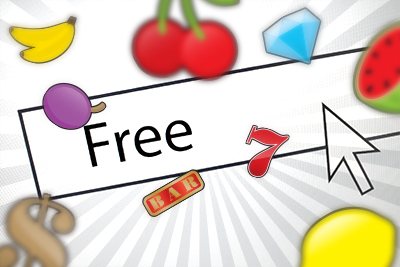
They're just not Free, damn it, they're not free, and they should not be called free!!!
With that said, there are many different types of Free Games and that is just part of the evolution of Slot Machines. One of the more common types of Free Games is one in which matching so many symbols of a certain kind, starting with the first reel, simply results in getting the number of games corresponding to the lines and the number of symbols matched. However, other games such as Quick Hits have Free Games by which the player must hit, 'Free Games,' symbols on the second, third and fourth reels and then they get taken to a different screen upon which they must select from twenty boxes until they get three like results, or two like results along with the +5 Free Games box, and that is what results in the number of spins the player gets.
There are still other variations of Free Games in which it is based on Scatter symbols on three or more different reels, or which can award Free Games on top of Free Games for getting another set of Free Games as a result during Free Games that are already being played. There are incredibly stupid games that I do not understand in which players are capable of getting literally hundreds of Free Games, but often the Free Games (taken individually) are worth so little that the player is not guaranteed to win more than a few bucks. On some of these games, if the player does not want to sit through the plethora of spins, the player may then choose something called a, 'Balance of Fortune,' whereby the player can select to accept a, 'Prize Range,' that will be rewarded to the player immediately.
Meanwhile, some machines have what I call the capacity for, 'Slam-Stopping,' while others do not. What, 'Slam-Stopping,' is that it stops the virtual reels almost immediately (the outcome has still been decided by the RNG and will not change as a result) rather than watching the entire spin play through at the normal speed. While I would not normally slam stop on a machine that is only capable of something like fifty Free Games (other than slam stopping so I don't have to watch credits being counted up on a good hit) I would certainly love to slam stop on a game in which every individual spin has a high probability of being nearly worthless...and some of those machines don't have that capacity!
Usually winning is not a miserable experience, but in my experience on some of these machines, it certainly can be sometimes. It would definitely be different if I could just slam through the two-hundred-and-ridiculous Free games, but when I have to watch each individual spin with each individual worthless Line Pay being highlighted and listen to the music playing in order to commemorate the spin at 6:43p.m. on July 7th 2016 on my 182nd Free Game that won me the lofty sum of……..two dollars and forty-three cents…….things have gotten a bit out of hand.
The music is blaring, virtual fireworks are going off, the lady next to me is looking at me in bewilderment wondering when the Slot Techs are going to show up with my two-thousand dollar hand pay and I have only won two dollars and forty-three cents on that Spin, I am going into spin number 183 out of at least 230 on these Free Games and, so far, I am up to $27.82 total. While the amount that I am making an hour is technically pretty good on these Free Games, these have, so far, been the most miserable fifteen minutes of my entire life.
Mystery Bonuses

There are a number of other features that have become both possible and prevalent since the advent of the new era of Slot Machines. For one thing, slot machines with Mystery Bonuses are commonplace. One new one that I just saw (but didn't play) is some sort of goofy Progressive in which a game is randomly awarded whereby a Monkey with a hammer hits some sort of discs that look like colored hockey pucks and the more of these disks are broken, the greater the player's prize is. There are also bananas that are placed at certain levels along the way as well as a, 'Stamina,' bar for the Monkey which will go back up somewhat every time he is able to eat some bananas, of course, the player has nothing to do with whether or not the monkey reaches the bananas.
This was, by far, the most ridiculous game I have ever seen in my entire life...I take that back, games where you can get more than a hundred Free Games are the most ridiculous...but still, you have a Monkey that the player doesn't control hitting disks and gaining stamina that the player has no control over in order to try to get to the Progressive Jackpot and while, yes, I understand that any Free Games is technically a random event, this is random AND has nothing to do with the actual spin and reel display, so it's just all patently ridiculous.
The bank was full, it was full when I first saw it, full when I went to the bathroom, full when I left the casino that day. I think all of the players except for one was the same, I couldn't have gotten a seat if I wanted one.
Bonus Games
There are other types of machines that are all a derivative, in my opinion, of the Hot Shot Progressives in which a player will trigger Bonus Games by hitting a symbol corresponding to the Bonus Game on generally at least three Reels and then those Bonus Games will be played at the conclusion of the Base Spin. The most recent variation of this that I have seen is, 'Lightning Jackpots,' in which I think a maximum of fifteen Bonus Games which are all essentially mini Slot Machines in their own right can be theoretically hit in one spin.

There are other games such as the regular Hee-Haw in which players can either choose a lesser number of Bonus Games with a greater multiplier on each game, or they can choose more Bonus Games with a lesser multiplier. There are games such as Texas Dice in which players may win a, 'Quick Draw,' Bonus Game in which the goal is to shoot stuff in order to increase the jackpot, or alternatively, a player might win the, 'Texas Dice,' Bonus where the player, 'Shoots,' virtual dice down a virtual board and is paid according to the final result of the dice.
Honestly, this just scratches the surface of many of the games out there that are available, and as, 'Skill-Based,' or partially Skill-Based games are being developed, I fully expect the library of games out there to become increasingly complicated and, perhaps, even more ridiculous in some cases. Of course, it is tough to determine whether all of the Skill-Based games will be slot games, or as NanoTech Gaming was attempting to do with its library before effectively shutting down, whether some of them will be fully self-contained games in their own right.
Top 10 Wizard of Odds Approved Casinos View All
Conclusion
While Slot Machines have changed significantly in terms of their presentations, there are a number of aspects of them that have either largely remained the same, or could be expected to remain the same based on our previous experiences. One thing that has remained the same is that the technology and display is always improving in order to enhance the player experience as well as get the players to spend their money. Furthermore, many unscrupulous people have outright tried to cheat the machines to varying degrees of success, and if I had to make a bet on it, I would at least suggest that there is someone out there trying to work on a method to successfully cheat the new and higher tech machines.
Furthermore, Slot Machines have always been loved for their simplicity. Even if the display and presentation to the player is no longer simple, the fundamental play of the machine is. You either hit a button, or as is less frequent, pull a lever, and then you see what happens. There is no intimidation factor as some people new to Table Games seem to perceive, it is just the player and the machine and there is no, 'Right,' or, 'Wrong,' way to play it...unless you are an Advantage Player, in which case the only question is, 'When?'
Another aspect of Slot Machines that has not changed over the years is that the players enjoy them for their capacity to return to the player a result many times greater than the amount initially bet. If nothing else, as we saw with machines such as MegaBucks, this tendency has become even more prevalent as the years have gone by and it is almost rare to see a slot machine that does not have the capacity, one way or another, to yield a payout of at least 1000x the amount bet.
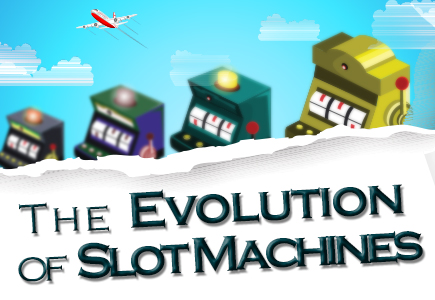
The final aspect that has, sadly, remained exactly the same is the fact that the players are not aware of the returns...and I say they could be! From their very inception, by and large, players just sat down and started pulling the handle in anticipation of the result. The potential payouts were clearly posted on the machines, but the probabilities associated therewith and overall percentage payouts of the machines were not posted. Players, in my view, have always had the capacity to change this by refusing to play unless they know the probabilities of each particular result as well as what the game returns on the whole...but players, by and large, have not demanded this information by refusing to play until it becomes available.
I firmly believe that players could effectuate this change simply by refusing to play Slot Machines and sending letters and/or E-Mails to the casinos as well as the Slot Manufacturers saying that they used to play the Slot Machines, but are now refusing until they are told what sort of a payback percentage they are getting. If the manufacturers and casinos did not want their bottom lines to get killed, then what choice would they have but to comply? Is it not true that the House Edge is known for nearly every Table Game as well as the vast majority of Video Poker Games? Why should slots be any different?
Personally, I think that the answer is that Slot Machines should not be any different and that, other than Advantage Players, people would do better to refuse to play until they are given this information. But, simply put, while the Slot Machines have evolved, the players haven't.

